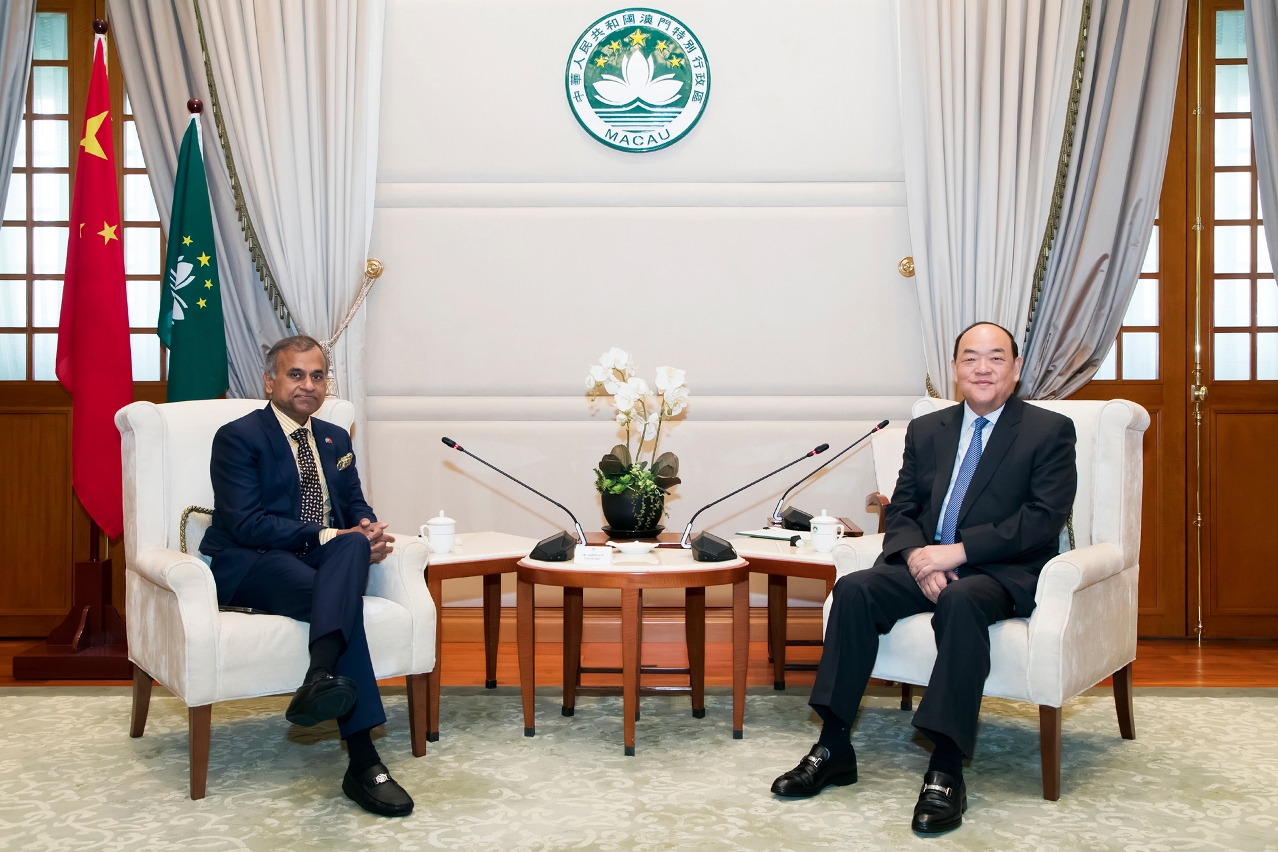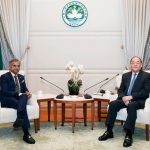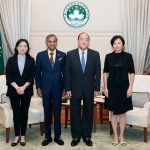 The Chief Executive, Mr Ho Iat Seng, meets with the newly-appointed United Nation Resident Coordinator in China, Mr Siddharth Chatterjee.
The Chief Executive, Mr Ho Iat Seng, meets with the newly-appointed United Nation Resident Coordinator in China, Mr Siddharth Chatterjee.
The Chief Executive, Mr Ho Iat Seng, today met with the United Nations (UN) Resident Coordinator in China, Mr Siddharth Chatterjee, to exchange views on multilateral cooperation, UN’s sustainable development goals and the nurturing of talented individuals in the fields of science and technology.
During the meeting at the Government Headquarters in Macao, the Chief Executive welcomed to the city the newly-appointed UN Resident Coordinator in China, and gave a briefing on the latest developments in Macao and the overall policy direction of the city.
Macao was devoting utmost effort to pushing forward sustainable development strategies in accordance with guidance from the Central Government, Mr Ho said. As a commercial and trade cooperation service platform between China and Portuguese-speaking countries, Macao had maintained close ties with Portuguese-speaking countries and their representatives delegated to the Permanent Secretariat of the Forum for Economic and Trade Co-operation between China and Portuguese-speaking Countries, helping realise progress on multilateral cooperation for joint development, Mr Ho added.
Mr Ho also talked about the United Nations University International Institute for Software Technology, mentioning it had nurtured a great number of talented individuals since its establishment in Macao. The Macao Special Administrative Region (MSAR) Government would work closely with the Institute to explore how it could play an even more active role in future.
Speaking during the meeting, Mr Chatterjee said President of China, Mr Xi Jinping, had stressed the significance of multilateralism and sustainable development, and that the UN was the focus of the effort to safeguard world peace.
Macao could be developed as a hub for science and technology, using that sector and advancement in other areas of innovation, in order to promote sustainable development, not only within the Guangdong-Hong Kong-Macao Greater Bay Area but also other parts of China, and even other countries in the world, Mr Chatterjee added.
As well as pursuing trade and commerce, Macao could also push forward development in cooperation on academic matters. The UN was looking forward to extending cooperation with Macao with regards to talent development, he said. The United Nations University International Institute for Software Technology and the MSAR Government would jointly explore how to develop Macao as a science and technology hub.
Also attending today’s meeting was the Director of the United Nations University International Institute for Software Technology, Ms Huang Jingbo. During the gathering, she gave a briefing on the Institute’s work over the recent years and prospects for future development.
Ms Huang said she looked forward to setting up a mechanism for training talented people, to create opportunities for young people either in Macao or on the mainland to receive training from the UN universities and get to know more about the UN’s work.
The Chief Executive said Macao devoted great attention to promoting the science and technology sector, and to cultivating a greater number of talented people to support the sector’s development. Mr Ho shared an example, saying software technology, artificial intelligence would be crucial to predictive science relating to disasters. The UN’s Institute and local universities could work closely to exchange views and step up cooperation regarding how to bolster interest in science and technology, and in artificial intelligence, among the younger generations. Such steps would be a path for sustainable development, Mr Ho added.
The Chief-of-Office of the Chief Executive’s Office, Ms Hoi Lai Fong, also attended today’s meeting.



